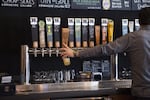
A file photo of taps at Widmer Brothers Brewing in Portland, Ore.
Bryan M. Vance / OPB
Some of Oregon’s most iconic breweries are changing hands once again and going to a perhaps unlikely owner: an international cannabis and lifestyle company.
St. Louis-based Anheuser-Busch struck a deal this week to sell Bend’s 10 Barrel Brewing Co. and Portland’s Widmer Brothers Brewing and Square Mile Cider Co. as part of an eight-brand acquisition by Tilray Brands.
Erik Siemers, editor of the St. Louis Business Journal, joined OPB’s “All Things Considered” host Crystal Ligori to discuss the acquisition. An edited version of their conversation is below.
Crystal Ligori: Can we start by getting a little background on the acquisition that happened this week?
Erik Siemers: So Tilray, a company based out of New York, owns a lot of cannabis brands, cannabis dispensaries and product companies rooted largely in Canada. They have acquired from Anheuser-Busch, eight beverage brands, most notably [the] really popular Portland brewery Widmer Brothers and 10 Barrel out of Bend, as well as Square Mile Cider, which is based in Portland. (The deal) also includes Shock Top out of Colorado, Breckenridge Brewery out of Colorado, Red Hook Brewery out of Seattle, Blue Point Brewing Company out of New York and Highball Energy, an energy drink company with its roots in San Francisco.
Ligori: Why do you think it was these brands that were chosen for the acquisition?
Siemers: It’s hard to say specifically brand by brand, but Anheuser-Busch went on an acquisition spree in the early 2000s, buying up what they saw as growing craft beer brands — or in the case of Widmer Brothers, beloved established brands. Rather than letting the craft beer industry take market shares with them, it was sort of, “If you can’t beat them, join them” kind of strategy. Some of the brands that Anheuser-Busch acquired became part of their widely distributed portfolio of products. A good example of that is Kona Brewing, which has become one of Anheuser-Busch’s most widely distributed craft beer brands. You can get it pretty much anywhere in the country. The brands that they seem to have shed this week to Tilray have largely been regional brands, and they’ve kept them as regional brands throughout their ownership.
Ligori: Why would a cannabis company want to start buying craft beer brands?
Siemers: Tilray has already dipped its toe in the water, so to speak, with craft breweries. They own Sweet Water out of Atlanta, which is another widely distributed craft beer brand. They bought the assets of Green Flash Brewing, which a lot of Portland drinkers might remember from a decade ago when they were a very popular up-and-coming San Diego Brewery that really expanded so fast and kind of collapsed upon themselves. They bought those brand assets out. They do have enough craft beer holdings that it made them the ninth-largest owner of craft beer in the country. With this deal, it would make them number five. It really indicates that Tilray is a company that feels like, while craft beer as a whole might be struggling, it’s something that they feel they can gain some ground on. They see a lot of growth opportunities still in the market.
Ligori: You recently wrote about the pretty significant drop in net profit for Anheuser-Busch that happened in the last quarter. Do you think it’s part of a larger trend of “zero proof” and non-alcoholic beer and spirits that are starting to gain traction in the market?
Siemers: I think, more broadly speaking, two things are happening with Anheuser-Busch. One is their net profits and particularly their revenue in North America have diminished considerably, which many people and analysts attribute to the decline in Bud Light after a boycott over the partnership with a transgender social influencer put them into the political landscape in ways they did not expect. It’s had a pretty detrimental effect on their U.S. sales. This last quarter alone, U.S. sales fell by almost 11% from a year ago. Sales to wholesalers declined by 15% and retailers by 14% almost primarily due to a decline in Bud Light sales.
At the same time, the craft beer market [has] sort of slowed under the weight of increased competition from every other beverage category. Whether that be non-alcoholic, zero-proof liquor or hard seltzers that emerged in the past few years. More and more breweries don’t feel like they could compete solely on beer anymore. So they’ve branched into distilling, they do hard seltzers, they’re dipping their toe in every beverage category because consumers’ tastes are shifting toward more than just beer. Those two things combined make a lot of sense for them to want to shed these assets.
Ligori: For fans of the breweries and cidery that are being sold, what can they expect? And what can Tilray expect by acquiring them?
Siemers: I used to live in Portland [and] if I remember correctly, most craft beer fans prefer their breweries to be fiercely independent. I remember some of the uproar when 10 Barrel was acquired in 2014 by Anheuser-Busch. But I think the upside here is that they’re being acquired by a brand that wants to invest in them, that wants to expand their operations, that has ambitions to itself be much bigger. The company that acquired them essentially said they intend to drive revenue [and] growth in these brands. They intend to invest in those brands. It’s very much they want to innovate, they want to find better retail partners, expand distribution ... that all suggests a brighter future for them assuming this company can navigate the headwinds that are facing craft beer in general.
